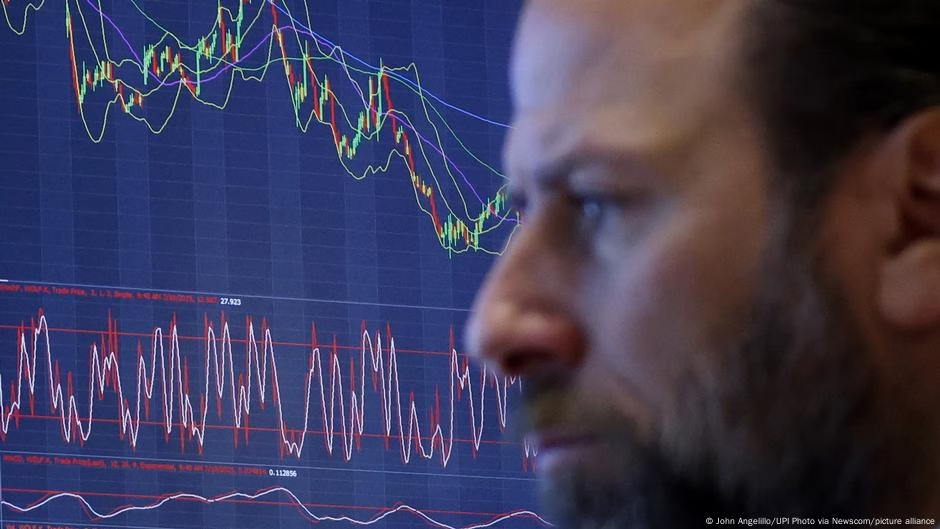<
div>Numerous investors were convinced that Donald Trump’s comeback to the White House as the United States’ president would be immensely beneficial for the US stock market, which had already set all-time highs in recent months thanks to the artificial intelligence (AI) boom.
They rationalized that the negotiation-savvy “America First” president would be attentive to any uncertainty in financial markets caused by his tariff policy and would likely intervene if necessary to stabilize prices.
However, after weeks of uncertainty regarding Trump’s protectionist measures, on Monday US stocks plummeted sharply, against a backdrop of fears that the world’s largest economy could plunge into recession later this year.
The Dow plummeted nearly 900 points, the S&P 500 dipped 2.7%, and the Nasdaq tumbled 4% — its steepest drop in two-and-a-half years.

Trump advisor Musk’s Tesla led sell-off
Tesla plummeted by 15%, while the Magnificent 7 stocks — Apple, Microsoft, Google parent Alphabet, Amazon, Nvidia, Meta and Tesla — collectively entered bear market territory. Deutsche Bank noted how Mag 7 stocks have shed over 20% of their value since December.
Bloomberg reported that the combined wealth of the five billionaires who attended Trump’s inauguration has been slashed by $209 billion (€191 billion) since January 20. Tesla CEO Elon Musk alone has lost $144 billion.
Markets appeared to react to comments made by the president over the weekend, downplaying the impact of his on-off tariff threats to countries such as Canada, Mexico and other significant trading partners.
The Republican also seemed dismissive about the impact of his negotiation tactics on stocks.
“There could be a little disruption as the financial markets, but I’ve got to do what is best for the nation. You can’t really watch the stock market,” Trump told Fox News on Sunday.
“President Trump seems to have turned his back on the US stock market and is willing to prioritize his political vision over the near-term outlook for the US economy,” Kathleen Brooks, research director at trading platform XTB, noted in a research note Monday, following the market downturn.
Citi downgraded US stocks to “neutral” from “overweight” after the market closed, warning that the investment bank now believes US growth momentum will “undershoot” the rest of the world.
British banking giant HSBC also reduced exposure to US equities to neutral over the next three to six months, stating that the lender sees “better opportunities elsewhere for now.”
No soft landing for the US economy?
Over the past year, US policymakers have been striving to prevent plunging the economy into recession.
Interest rates have declined from their peak of 5.33%, which helped bring down inflation from its recent multi-decade highs.
However, Trump’s various tariff policies threaten to upset efforts to achieve a soft landing. As of Wednesday, new 25% levies on all steel and aluminum imports into the US will come into effect. Also, tariffs on Chinese goods have doubled to 20%.
Susannah Streeter, head of money and markets at Hargreaves Lansdown, warned: “The prospect of a recession in the US looms large, with consumer confidence falling, companies contending with increased trade complexity and investors growing more apprehensive.”
Additionally, the major public sector cuts led by the Department of Government Efficiency (DOGE) under Musk threaten to weaken growth, as they will eliminate jobs and investment from the economy.
Treasury Secretary Scott Bessent acknowledged last week a period of “natural adjustment” as the US transitions from higher government spending to the private sector.
“The economy and the market have become interdependent. We’ve become reliant on this government spending, and there’s going to be a withdrawal period,” Bessent told CNBC Friday, adding that a “one-time price adjustment” is to be expected from Trump’s tariff policy.
Also looming over the US economy is the threat of a partial shutdown of the federal government should new funding not be finalized by a Friday deadline.
The Republican-controlled US House of Representatives will vote Tuesday on legislation that would maintain full government financing.







